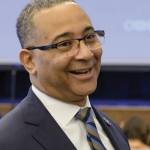Nick Cimillo ’26
Executive Features Editor
This semester sees the introduction of the Social Justice Fellowship, a new initiative that enables Trinity students to learn about, and gain experience with, activism for course credit. Co-sponsored by the Human Rights Department and the Trinity Social Justice Institute (TSJI), the student-led fellowship consists of 14 students and has had its first few meetings. The Tripod sat down with the fellowship’s student coordinators — Allie Mikalatos ’25 and Anna Grant-Bolton ’25 — to talk about their backgrounds with social justice advocacy and the specific work the fellowship has started with. In addition, American Studies and Human Rights Professor and TSJI Co-Founder Christina Heatherton weighed in on the fellowship’s significance from a faculty perspective.
Mikalatos recalled her own experience with advocacy dating back to before her time at Trinity. “I have a little bit of experience with union organizing,” she said. “I did a little bit of work with trying to start up a union at a company I was at… It was a really good experience and, I think, one of the places where I first started to learn [that] I want to be an organizer and help people come together to make their work environments, schools and cities a better place.” Grant-Bolton got her start with activism during the Black Lives Matter movement in 2020: “I joined an organization that was doing work to challenge police violence in the community and work towards non-police-violence intervention systems… I didn’t know anything about community organizing going in [to that] — I don’t think any organizer does — and so creating a space where everyone is able to learn how to organize together, and feel empowered to do so, is important to me.”
Making the knowledge and skills of community organizing accessible to Trinity students was one of the main drivers behind the fellowship’s formation. Mikalatos, citing her first-year-self as an example, noted that there are often “a lot of first-year students who aren’t necessarily connected to social justice organizations yet, but are so excited to get connected.” Grant-Bolton added, “We wanted to create a program where students would be able to learn the skills that they need to feel like they could be powerful leaders for social justice and activism on campus, [and] also beyond.”
The fellowship also serves as a way to pass on the skills accrued by student activist leaders. “The thing about college,” Heatherton added, “is [that] the clock always gets reset every four years. And so the really exciting part of this effort is [that] student organizers [get] to share their skills and build community with younger students, so there’s a continuity of knowledge across the classes.” Grant-Bolton shared this sentiment, saying, “We talked to faculty who [agreed that we] really need to find students who are going to carry these movements on. A lot of the people who are leading social justice organizations and movements [are] going to have graduated, and we don’t want the skills and the knowledge we’ve all collectively built together to dissipate.”
That work has already started among the group of students now enrolled in the fellowship. “We were hoping to get three to four applicants,” Mikalatos explained, “and we ended up having [around] 18. We finished off with a group of 14 students who are joining the fellowship, which we were just so excited about.” Currently, fellowship meetings typically consist of workshops helped along by visiting student leaders, faculty members and Hartford community organizers who discuss their experiences with activism. Heatherton added that the workshop model “is really imaginative and inventive; students are inviting people who have different types of expertise… I have been invited to do a workshop about conducting activist research, which is something that I’ve been involved with for a long time.”
Mikalatos pointed to some of the guiding questions the fellowship is considering in this early stage: “‘What is community?’ ‘How do you build [a] community [with] people who want to do this work with you?’ And then as we move forward, we’ll be [asking]: ‘How do you envision a campaign?’ ‘How do you find an actionable goal that you can win on?’ ‘How do you negotiate with the people who have power?’ [We’re] essentially going through skills that we think could come up while you’re organizing, in whatever space you’re organizing in.”
Community is an important motif undergirding the fellowship. “Another thing we’re really trying to focus on,” Grant-Bolton said, “is creating what feels like a strong social justice community on campus. I really believe that in order for social justice movements to be sustainable, students need to feel supported and cared for within the movements that they’re part of… Social justice work is so hard and can be so draining because it can take so many years, or even decades, to get a single victory. And so having the process of social justice work feel fulfilling and meaningful to people, and being able to celebrate the small wins together, is an accomplishment in and of itself.”
Faculty members such as Heatherton are aware of the work student activists put in: “[Students] finish their coursework,” Professor Heatherton said, “[and then] they’re going into organizing meetings. It’s like a whole other second shift of work. We’re trying to be mindful of the effort involved in making sure that students are getting credit for the very important work that they’re doing… Faculty figured out ways for students to get curricular credit this semester, and hopefully co-curricular credit in the future.”
With students already having enough on their plates, making activism resources accessible to the Trinity community is a defining goal of the Social Justice Fellowship. The project represents the combined efforts of multiple student advocacy organizations, including Students Against Mass Incarceration (of which Grant-Bolton is co-founder and Professor Heatherton is faculty advisor), Trinity Students & Faculty Coalition for Justice in Palestine (of which Mikalatos is a member), Trinity Environmental and Climate Justice and Trinity Against Gun Violence. These organizations inform what Grant-Bolton calls the fellowship’s “huge net” of social justice interests, and in turn are made more accessible to activism-minded students. “But,” Grant-Bolton concluded, “just because you’re not in the fellowship doesn’t mean that you’re not wanted at social justice events and clubs on campus… there’s no need to wait for next semester to get involved in social justice work. The student movements need you now, and you’ll have a home there if you want it.”


+ There are no comments
Add yours